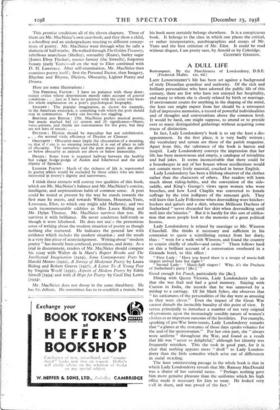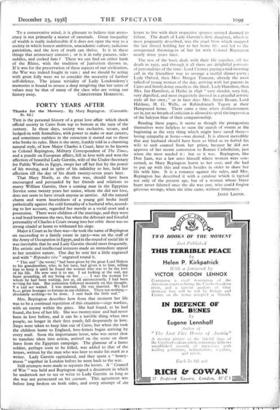A DULL LIFE
LADY LONDONDERRY'S life has been set against a background of truly Disraelian grandeur and authority. Of the rich and brilliant personalities who have adorned the public life of this century, there are few who have not enjoyed her hospitality, and many to whom she is closely related by birth or marriage. If environment counts for anything in the shaping of the mind,
the least one might expect from her should be a retrospect full of impressive memories, a record of powerful individualities and of thoughts and conversations above the common level.
It would be hard, one might suppose, to attend or to preside over so many distinguished gatherings without acquiring some traces of distinction.
In fact, Lady Londonderry's book is to say the least a dis- appointment. In the first place, it is very badly written ; the vocabulary and syntax are those of the parish magazine. Apart from this, the substance of the book is barren and insipid. Lady Londonderry conveys the impression that her life has been monotonous and empty, a catalogue of trivialities and bad jokes. It seems inconceivable that there could be a housekeeper in any of her houses whose recollections would not contain more lively material, couched in better English.
Lady Londonderry has been a lifelong observer of the clothes rather than the characters of others. Her readers will learn much about riding-habits, and the convention of the side-, saddle, and King's George's views upon women who wore breeches, and how Lord Chaplin was converted to female
suffrage by the trim jodhpurs of the remount girls. They will learn that Lady Folkestone when deerstalking wore knicker-
bockers and gaiters and a skirt, whereas Millicent Duchess of Sutherland " never discarded her skirt when deerstalking until well into the 'nineties." But it is hardly for this sort of edifica-,
tion that most people look to the memoirs of a great political hostess.
Lady Londonderry is related by marriage to Mr. Winston Churchill. She thinks it necessary and sufficient in his connexion to quote a scintillating extract from her diary, thus : " went for a walk with Winston, and found the country to consist chiefly of smells—and swine." There follows hard on this a brilliant account of a conversation overheard in a Granada hotel, to this effect :
" First Lady : ' Have you heard there is a troupe of music-hall singers arrived here last night ? '
Second Lady : Music-hall singers ! Why, it's the Duchess of Sutherland's party ! [&c.] ' " Good enough for Punch, particularly the [&c.].
Dining with Queen Victoria, Lady Londonderry tells us that she was frail and had a good memory. Staying with Curzon in India, she records that he was unmoved by a mishap to a carriage. Of Sir Mark Sykes, she observes that " his caricatures of the personalities of the day were as amusing as they were clever." Even the impact of the Great War cannot disturb the invincible banality of this point of view. It
serves principally to introduce a number of not very original observations upon the increasingly sensible nature of women's clothes as an important outcome of the hostilities. For example, speaking of pre-War lawn-tennis, Lady Londonderry remarks that "a glance at the costumes of those days speaks volumes for the zeal of sportswomen." For her own part, she " always wore uniform " throughout the War, and found as a result that life was " never so delightful," although her identity was frequently mistaken. This she took in good part, for it is clear that nothing appears more " droll " to. Lady London-
derry than the little comedies which arise out of differences in social standing.
The least uninteresting passage in the whole book is that in which. Lady Londonderry reveals that Mr. Ramsay MacDonald was a sharer of her sartorial tastes. " Perhaps nothing gave him more genuine pleasure than the uniforms which his high office made it necessary for him to wear. He looked very well in them, and was proud of the fact." To a conservative mind, it is pleasant to believe that aristo- cracy is not primarily a matter of externals. Great inequality of wealth is really indefensible if it does not open the way to a society in which honest ambition, unacademic culture, judicious patriotism, and the love of truth can thrive. Is it in these things that aristocracy consists ; or is it in ruby parures, side- saddles, and cocked hats ? These we can find on either bank of the Rhine, with the tradition of Junkerism thrown in. If it was for the preservation of these aspects of our civilisation, the War was indeed fought in vain ; and we should be acting with great folly were we to consider the necessity of further self-defence. The jejune triviality of Lady Londonderry's memories is bound to arouse a deep misgiving that her sense of values may be that of many of the class who are voting our



































 Previous page
Previous page